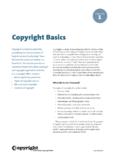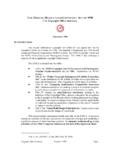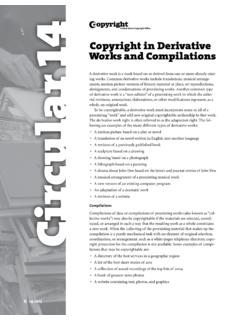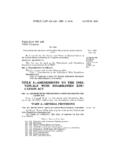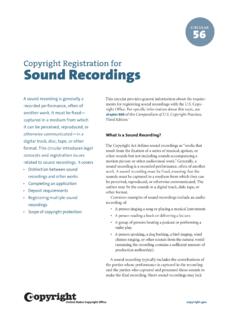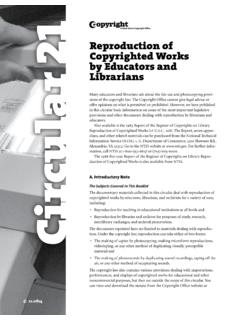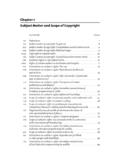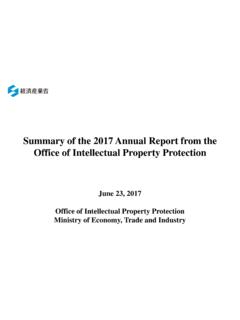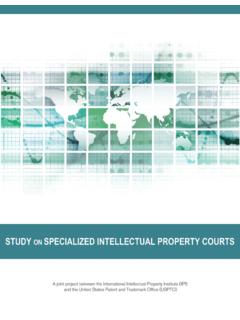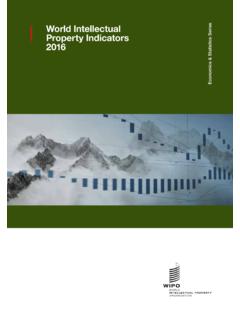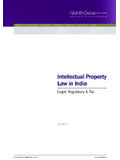Transcription of Duration of Copyright 15 Circular
1 WCircular 15a2 of CopyrightThe provisions of Copyright law dealing with Duration are complex. Different standards apply depending on whether federal statutory Copyright protection was secured before or on or after January 1, 1978, the date the current law the Copyright Act of 1976 took effect. In addition, several amendments enacted since January 1, 1978, affect Duration . This Circular describes the changes to the law that affect Duration and gives details about terms of protection for copy-rights secured and renewed on certain First Securing Federal Statutory protection on or after January 1, 1978 For works securing federal statutory protection for the first time on or after January 1, 1978, the Copyright Act of 1976, as amended in 1998, establishes a single Copyright term and different methods for computing the Duration of a Copyright .
2 Works of this kind fall into two Created on or after January 1, 1978 The law automatically protects a work that is created and fixed in a tangible medium of expression on or after January 1, 1978, from the moment of its creation and gives it a term lasting for the author s life plus an additional 70 years. For a joint work prepared by two or more authors who did not work for hire, the term lasts for 70 years after the last surviving author s death. For works made for hire and anonymous and pseudonymous works, the dura-tion of Copyright is 95 years from first publication or 120 years from creation, whichever is shorter (unless the author s identity is later revealed in Copyright Office records, in which case the term becomes the author s life plus 70 years).
3 For more information about works made for hire, see Circular 9, Works Made for Hire under the 1976 Copyright Act. For details about pseudonymous works, see fl 101, in Existence but Not Published or Copyrighted on January 1, 1978 The law automatically gives federal Copyright protection to works that were created but neither published nor registered before January 1, 1978. The Duration of Copyright in these works is generally computed the same way as for works created on or after January 1, 1978: life plus 70 years or 95 or 120 years, depending on the nature of authorship. However, all works in this category are guaranteed at least 25 years of statutory protection . The law specifies that in no case would Copyright in a work in this category have expired before December 31, 2002.
4 In addition, if a work in this category was published before that date, the term extends another 45 years, through the end of of Copyright 2 Works Already Under Statutory protection before 1978 For works that had already secured statutory Copyright pro- tection before January 1, 1978, the 1976 Copyright Act retains the system in the previous Copyright law the Copyright Act of 1909 for computing the Duration of protection , but with some changes. Duration under 1909 ActFederal standards for Copyright Duration differ substantially under the 1909 act compared with the 1976 act because of the renewal term contained in the 1909 act. Under the 1909 act, federal Copyright was secured on the date a work was published or, for unpublished works, on the date of registration.
5 A Copyright lasted for a first term of 28 years from the date it was secured. The Copyright was eligible for renewal during the final, that is, 28th year, of the first term. If renewed, the Copyright was extended for a second, or renewal, term of 28 years. If it was not renewed, the Copyright expired at the end of the first 28-year term, and the work is no longer protected by Copyright . The term of Copyright for works published with a year date in the notice that is earlier than the actual date of publication is computed from the year date in the Copyright of 1976 Act on Length of Subsisting CopyrightsThe 1976 Copyright Act carried over the system in the 1909 Copyright Act for computing Copyright Duration for works protected by federal statute before January 1, 1978, with one major change: the length of the renewal term was increased to 47 years.
6 The 1998 Copyright Term Exten-sion Act increased the renewal term another 20 years to 67 years. Thus the maximum total term of Copyright protec-tion for works already protected by January 1, 1978, has been increased from 56 years (a first term of 28 years plus a renewal term of 28 years) to 95 years (a first term of 28 years plus a renewal term of 67 years). Applying these standards, all works published in the United States before January 1, 1923, are in the public Extension for Works in Renewal TermWorks originally copyrighted after 1922 and renewed before 1978. These works were automatically given a longer copy-right term. Copyrights that had already been renewed and were in their second term at any time between December 31, 1976, and December 31, 1977, inclusive, do not need to be renewed again.
7 They have been automatically extended to last for a total term of 95 years (a first term of 28 years plus a renewal term of 67 years) from the end of the year in which they were originally secured. For more information about renewal of Copyright , see Circular 15, Renewal of Extensions before 1976 ActBefore passage of the 1976 Copyright Act, Congress enacted a series of nine acts that provided interim extensions for works whose Copyright protection began between September 19, 1906, and December 31, 1918, if they were in their renewal terms. Without these interim extensions, copyrights com-mencing during that time would have expired after 56 years, at the end of their renewal terms, between September 19, 1962, and December 31, : A work that first secured federal Copyright pro- tection on October 5, 1907, and was renewed in 1935, would have fallen into the public domain after October 5, 1963.
8 The first act extended the Copyright to December 31, 1965; the second act extended it to December 31, 1967; the third act extended it to December 31, 1968; the fourth act extended it to December 31, 1969; the fifth act extended it to December 31, 1970; the sixth act extended it to December 31, 1971; the seventh act extended it to December 31, 1972; the eighth act extended it to December 31, 1974; the ninth extended it to December 31, 1976; and the 1976 Copyright Act extended the Copyright through the end of 1982 (75 years from the end of the year in which the Copyright was originally secured).Mandatory RenewalWorks originally copyrighted between January 1, 1950, and December 31, 1963. Copyrights in their first 28-year term on January 1, 1978, still had to be renewed to be protected for the second term.
9 If a valid renewal registration was made at the proper time, the second term will last for 67 years. However, if renewal registration for these works was not made within the statutory time limits, a Copyright originally secured between 1950 and 1963 expired on December 31 of its 28th year, and protection was lost Renewal and Voluntary RegistrationWorks originally copyrighted between January 1, 1964, and December 31, 1977. Congress amended the Copyright law on June 26, 1992, to automatically renew the Copyright in these works and to make renewal registration for them optional. Their Copyright term is still divided between a 28-year origi-nal term and a 67-year renewal term, but a renewal registra-tion is not required to secure the renewal Copyright .
10 The renewal vests on behalf of the appropriate renewal claimant upon renewal registration or, if there is no renewal registra-tion, on December 31 of the 28th year. For details about the benefits of making a renewal registration, see Circular 15, Renewal of of Copyright 3 Year-End Expiration of Copyright TermsThe 1976 Copyright Act provides that all terms of Copyright will run through the end of the calendar year in which they expire. This provision affects the Duration of all copyrights, including those in either their first or their second term on January 1, 1978. For works eligible for renewal, the renewal filing period begins on December 31 of the 27th year of the Copyright : Under the 1909 Copyright Act, terms of Copyright and renewal filing periods corresponded with dates of publication or registration, not calendar of Copyright in Certain Foreign WorksUnder the provisions of the Uruguay Round Agreements Act (URAA), certain foreign works whose Copyright protection had been lost because of noncompliance with formalities of law, were restored as of January 1, 1996.
